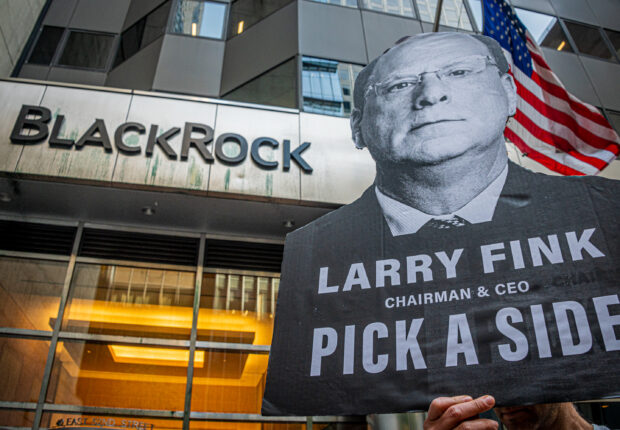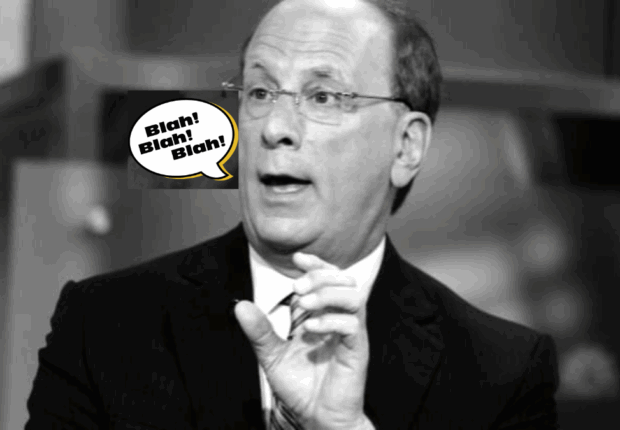Fink said a lot at the world’s biggest climate conference (and in the weeks leading up to it). Here’s why most of it wasn’t helpful.

Throughout COP26, Larry Fink has been commenting on what BlackRock’s role should be in reducing global emissions, consistently painting a picture that the firm can only do so much and is already taking adequate action. The BlackRock’s Big Problem campaign is a network of NGOs, financial advocates, researchers, academics, and grassroots groups who know that investor giants like BlackRock can and must drive the rapid decarbonization that this moment calls for. Over the last week, we’ve been compiling data and expertise across our network to provide counterarguments to Fink’s most common COP26 deflections and demonstrate that BlackRock has both the power and the responsibility to take bold action right now. Read on for an alternate perspective on Fink’s most recent Fink-isms.
Divestment vs engagement
“We can’t just ask public companies to move forward without the rest of society. It’s going to create the biggest capital market arbitrage, and we’re seeing that more hydrocarbons have been sold to private companies in the last two years than almost any time ever. It can’t be a window dressing of public firms. That doesn’t change the world at all, it actually makes the world even worse because it moves from public disclosed companies to opaque private enterprises. So, the mission is failing if that’s all you’re doing.” – Larry Fink at COP26 on Nov 2nd 2021 in an interview with CNBC
- At its core, this is a ‘divestment vs engagement’ argument and Larry Fink seems to be adding layers to his position for why BlackRock can’t and should not divest. The fear is that if BlackRock doesn’t have a seat at the table by owning shares, they can’t change a company. If Fink’s main argument to stay invested in heavy emitters is that this will allow BlackRock to engage with them, the asset manager has so far clearly failed to make good on its promise to use its leverage to ensure fossil fuel companies transition towards a 1.5 degree aligned pathway.
- In January 2020, Fink announced that BlackRock was going to make sustainability its new standard for investing, further promising to support shareholder proposals addressing climate-related risks and holding management accountable at companies that weren’t transitioning fast enough. Unfortunately, BlackRock ended up voting against 88% of shareholder resolutions on climate and social issues over the course of that year. A whopping 17 shareholder resolutions could have passed had BlackRock voted in favor of them.
- BlackRock’s voting record in 2021 didn’t look much better. In fact, BlackRock supported 96% of directors at S&P 500 oil & gas, electric power, and financial services companies during this year’s shareholder season. BlackRock did use its vote to support a couple of transition plans this year. However, it did so in the case of Total and Shell, two oil & gas majors, whose wholly inadequate transition plans foresee increasing emissions this decade, rather than lowering them.
- Private equity swallowing up fossil fuel assets is a credible threat. No one can predict how the energy market will change as the world moves towards a managed decline. But this can’t dampen BlackRock’s ambition using every tool – including capital exclusion – to drive energy companies towards a 1.5 degree aligned pathway. Rather than sounding the alarm about what might happen to fossil fuel assets if BlackRock doesn’t control them anymore, Larry Fink should lead by example and ensure that BlackRock’s entire portfolio is on track to reach zero emissions in 2050. This involves setting clear targets for a managed, rapid transition focusing on heavy emitters first. BlackRock has a responsibility and the ability to be driving that transition and must use its full power to get these companies to achieve it.
The role of government and how BlackRock does not want to be the climate police
“If governments are only asking public companies to move forward, and which are mostly large companies, then we’re going to be asking the large companies to be the climate police. And I don’t think that’s our role. [… ] “There lies the fundamental problem and that’s what I’m really worried about. I don’t want to be the environmental police,” he said. “I don’t want BlackRock — because we’re a large investor — to be telling every company who’s not moving forward [that] we’re going to divest of all your shares. That’s not a good outcome.” – Larry Fink on Sept 28th at the Ecosperity climate conference.
- First off, any government regulation of climate disclosure should also apply to private companies to level the playing field. Regulators in the US and abroad should be applying the strictest rules to private as well as publicly traded companies.
- We agree, we need government action AND for financial institutions to take their responsibility as those fueling the climate crisis seriously. Financial institutions have been bankrolling the climate crisis, providing the necessary cash flow for fossil fuel companies to continue their business as usual that got us into this mess in the first place. To be a real climate leader, BlackRock needs to reckon with its massive power and influence as the world’s largest asset manager and leading investor in fossil fuels and deforestation companies. Only then can BlackRock really claim to be a part of the solution rather than exacerbating the problem.
- Corporate commitments from financial institutions like BlackRock will not replace the need for assertive government action to drive decarbonization worldwide. However, financial institutions cannot be in the passenger seat. Only with a combination of government action and corporate directives can we initiate the system-wide shift necessary to stay on a 1.5°C pathway. BlackRock has had an enormous stake in the industries that have led to this crisis and now equally has an enormous stake in getting us on the right track. Success will not only require BlackRock’s participation, it will require its leadership and willingness to take initial, bold action.
Hydrocarbon companies are still a big part of the problem
“Hydrocarbon companies are part of the solution, not the problem” and “The pathway would not be from ‘brown to green’ but rather a gradual shift. Emerging economies should be moving from coal to natural gas before they are completely reliant on green energy.” – Larry Fink on Nov 2nd at COP26
- The IEA and IPCC have made it very clear that there is no room and also no need for new fossil fuel resources in a 1.5 degree scenario. As a leading investor in companies pushing for ever more exploration and extraction of fossils, BlackRock needs to draw a hard line against unnecessary and dangerous expansion and commit to a zero tolerance policy on anti-climate lobbying.
- Treating fossil gas as a “bridge fuel” is a pernicious myth that has been disproven for a decade. In fact, the latest research indicates that methane emissions from fossil gas are much greater than previously thought, contradicting the false claim that fossil gas is cleaner than other fossil fuels. Larry Fink advocating for a switch to gas is naive at best, and we would have expected better from him than to swallow the fossil fuel industry’s self-preservation attempts hook, line and sinker.
- Floods, fires, droughts, storms, and other extreme climate events have been disrupting our lives in a way that has become impossible to ignore. Science tells us that continuing to burn fossil fuels will only escalate climate breakdown. We must stop the flow of capital into fossil fuels while also introducing systemic changes to ensure a just transition for all workers.
People impacted by corporate inaction on the climate crisis have been taking action in record numbers and are continuing to escalate. In the leadup to and during COP26, we saw hundreds of thousands of people from all around the world calling on corporate actors who fuel the climate crisis to stop investing in, funding, insuring, and otherwise enabling continued climate destruction. These folks understand the role BlackRock plays in the climate crisis, and they know that BlackRock can stop investing in fossil fuels and companies that drive deforestation at any time. Fink can talk all he wants about where he believes he can and can’t respond to pressure, but our network remains committed to what we sought out to do from the beginning: push BlackRock to actually be the leader it claims to be on climate issues, and hold it accountable when it falls short. This time around, Fink’s line of thinking once again falls short.

